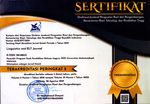"I Can Speak English. But, I'm Shy." Self Record Videos Posted on WhatsApp Group towards Students Speaking Skill
Abstract
Keywords
Full Text:
PDFReferences
Z. Akbari, “Current Challenges in Teaching/Learning English for EFL Learners: The Case of Junior High School and High School,” Procedia - Soc. Behav. Sci., vol. 199, no. August 2015, pp. 394–401, 2015, doi: 10.1016/j.sbspro.2015.07.524.
M. Behroozi and A. Amoozegar, “Challenges to English Language Teachers of Secondary Schools in Iran,” Procedia - Soc. Behav. Sci., vol. 136, pp. 203–207, 2014, doi: 10.1016/j.sbspro.2014.05.314.
A. A. Y. Azarfam and R. Baki, “Exploring language anxiety regarding speaking skill in Iranian EFL learners in an academic site in Malaysia,” Int. J. Appl. Linguist. English Lit., vol. 1, no. 2, pp. 153–162, 2012, doi: 10.7575/ijalel.v.1n.2p.153.
P. Sukrutrit, “Students’ Perceptions of Speaking English in Front of the Class Versus Speaking English via Self-Recorded Videos Posted on a Private Facebook Group,” Learn J. Lang. Educ. Acquis. Res. Netw., vol. 16, no. 1, pp. 272–295, 2023, [Online]. Available: https://so04.tci-thaijo.org/index.php/LEARN/index
R. Kalra and S. Siribud, “Public speaking anxiety in the Thai EFL context,” Learn J. Lang. Educ. Acquis. Res. Netw., vol. 13, no. 1, pp. 195–209, 2020.
P. Patahuddin, S. Syawal, and S. Z. Bin-Tahir, “Investigating Indonesian EFL Learners’ Learning and Acquiring English Vocabulary,” Int. J. English Linguist., vol. 7, no. 4, p. 128, 2017, doi: 10.5539/ijel.v7n4p128.
I. G. Riadil, “The EFL Learner’s Perspectives about Accuracy, Fluency, and Complexity in Daily Routines,” J. Res. Appl. Linguist. Lang. Lang. Teach., vol. 2, no. 2, pp. 160–166, 2019.
K. Tantiwich and K. Sinwongsuwat kornsakt, “LEARN Journal: Language Education and Acquisition Research Network Thai University Students’ Problems of Language Use in English Conversation,” Journal, vol. 14, no. 2, pp. 598–626, 2021, [Online]. Available: https://so04.tci-thaijo.org/index.php/LEARN/index
M. Lak, H. Soleimani, and F. Parvaneh, “The Effect of Teacher-Centeredness Method vs. Learner-Centeredness Method on Reading Comprehension among Iranian EFL Learners,” J. Adv. English Lang. Teach., vol. 5, no. 1, pp. 1–10, 2017, [Online]. Available: www.european-science.com/http://www.european-science.com/jaelt
D. D. Ponmozhi and A. Thenmozhi, “Difficulties Faced By the Rural Students in Learning English at High School Level,” IOSR J. Humanit. Soc. Sci., vol. 22, no. 06, pp. 31–34, 2017, doi: 10.9790/0837-2206133134.
S. Okvireslian, “Pemanfaatan Aplikasi Whatsapp Sebagai Media Pembelajaran Dalam Jaringan Kepada Peserta Didik Paket B Uptd Spnf Skb Kota Cimahi,” Comm-Edu (Community Educ. Journal), vol. 4, no. 3, p. 131, 2021, doi: 10.22460/comm-edu.v4i3.7220.
H. dan W. Pranajaya, “Pemanfaat Aplikasi Whatsapp di Kalangan Pelajar: Studi Kasus di Mts Al Muddatsiriyah dan Mts Jakarta Pusat,” J. Orbith, vol. 14, no. 1, pp. 59–67, 2018, [Online]. Available: https://jurnal.polines.ac.id/index.php/orbith/article/view/1155
P. Purnaningsih, “Strategi Pemanfaatan Media Audio Visual untuk Peningkatan Hasil Belajar Bahasa Inggris,” J. Inform. Univ. Pamulang, vol. 2, no. 1, p. 34, 2017, doi: 10.32493/informatika.v2i1.1503.
E. Prema, “Use of Technology in the Teaching of Telugu Concepts to Create Enthusiastic Learning Environment — A Case Study among Educators,” vol. 9, no. 4, pp. 724–730, 2018.
S. W. Utomo and M. Ubaidillah, “Pemanfaatan Aplikasi Whatsapp Pada Utilization of Whatsapp Application on Problem-based Learning for,” J. Teknol. Pendidik. Vol 06/02 Desember 2018, vol. 06, no. 02, pp. 203–204, 2018.
M. Basri, “Asian EFL Journal Research Articles. Vol. 23 Issue No. 6.3 November 2019,” vol. 23, no. 6, pp. 181–203, 2019.
S. T. S. Ahmed, “Chat and learn: Effectiveness of using whatsapp as a pedagogical tool to enhance efl learners’ reading and writing skills,” Int. J. English Lang. Lit. Stud., vol. 8, no. 2, pp. 61–68, 2019, doi: 10.18488/journal.23.2019.82.61.68.
L.-M. Leong and S. M. Ahmadi, “An Analysis of Factors Influencing Learners’ English Speaking Skill,” Int. J. Res. English Educ., vol. 2, no. 1, pp. 34–41, 2017, doi: 10.18869/acadpub.ijree.2.1.34.
Y. Koyak and E. Üstünel, “The Recorded Motivational Videos to Improve the Speaking Skills of Adult Learners Yasemin Koyak 1 , Eda Üstünel 2,” Conf. Pap., vol. 2019, pp. 1–27, 2019.
S. Fatimah, T. Nurmanik, and ..., “WhatsApp Media to Improve Students’ Speaking Skill,” Pros. …, pp. 12–21, 2020, [Online]. Available: http://jurnal.stkipkusumanegara.ac.id/index.php/semnara2020/article/view/398%0Ahttp://jurnal.stkipkusumanegara.ac.id/index.php/semnara2020/article/download/398/473
N. D. Handayani, I. A. M. S. Widiastuti, and I. B. N. Mantra, “Leveraging Whatsapp Group As a Learning Device To Enhance Students’ Speaking Skills,” Int. J. Appl. Sci. Sustain. Dev., vol. 3, no. Vol. 3 No. 2 (2021): International Journal of Applied Science and Sustainable Development (IJASSD), pp. 51–57, 2021, [Online]. Available: https://e-journal.unmas.ac.id/index.php/IJASSD/article/view/2641/2046
Sudijono, Statistika Penelitian. 2004.
Wachidah Siti, Gunawan Asep, and Diyantari, Kelas 9 Bahasa Inggris BS press, vol. vi. 2018.
H. D. Brown, Te a c h i n g by Principles: An Interactive Approach to Language Pedagogy, Fourth edition. 2004.
H.Douglas Brown, “[H._Douglas_Brown]_Teaching_by_Principles,_Second_(BookFi.org).pdf,” Teaching by Principles An Interactive Approach to Language Pedagogy. p. 491, 2001.
DOI: https://doi.org/10.31764/leltj.v12i1.23983
Refbacks
- There are currently no refbacks.
Copyright (c) 2024 Lailatul Maghfiroh

This work is licensed under a Creative Commons Attribution-ShareAlike 4.0 International License.
_____________________________________________________
Linguistics and ELT Journal
p-ISSN 2339-2940 | e-ISSN 2614-8633

LELTJ is licensed under a Creative Commons Attribution-ShareAlike 4.0 International License.
_____________________________________________________
LELTJ is abstracting & indexing in the following databases:
_____________________________________________________
LELTJ Editorial Office:













